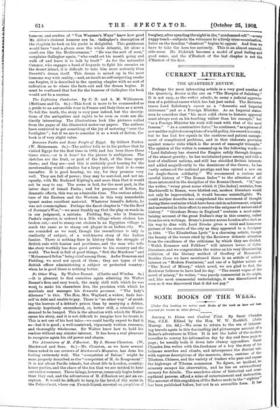No Other Way. By Walter Besant. (Chatto and Windus. Os.)
—It is pleasant to find ourselves again admiring Sir Walter Besant's firm and easy touch, the ready skill with which he was wont to make his characters live, the precision with which he marshals and manages his dramatis personae. " The lady's dilemma" is this. The. Hon. Mrs. Wayland, a widow, finds her- self in debt and unable to pay. There is "no other way" of avoid- ing the horrors of a debtor's prison than by marrying a debtor, already hopelessly encumbered, or, better still, a criminal con- demned to be hanged. This is the situation with which Sir Walter opens his story, and it is not difficult to imagine how he treats it. This is not one of his best tales—we could hardly expect to find it so—but it is good ; a well-contrived, vigorously written romance, and thoroughly wholesome. Sir Walter knew how to hold his readers without any sinister interest. It has been a real pleasure to recognise again his old power and charm.
The Adventures of M. d'Haricot., By J. Storer .Clouston. (W. Blackwood and Sons. 6s.)—Mr. Clouston, as we have several times noted in our reviews of Blackwood's Magasine, has done his fooling extremely well. .The "compatriot of Balzac " might be
more properly described as the "compatriot of M. de Rougemout." It is not about Pacific islands, but about life in London, country: house parties, and the chase of the fox that we are invited to hear our visitor romance. These things, however, commonly begin better than they end, and the adventures of M. d'Haricot are not an ex- ception.. Pt would be difficult to keen,to the level of the scene in the Police Court, where our French Wend, arrested on, suspicion of
burglary, after spending the night in tha!!conderaned cell "—a very happy touch—subjects the witnesses to a liTely cress-examination. Later on the familiar." chestnut " begins to appear. And then we have to take the hew too seriously. This is an almost unavoid- able error. Mr. Pickwick becomes a model of goad feeling and good sense, and the d'Haricot of the last chapter is not the d'Haricot of the first.










































 Previous page
Previous page